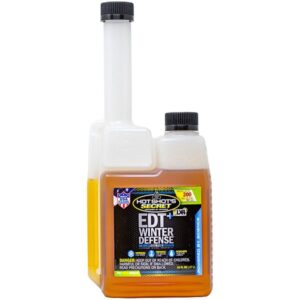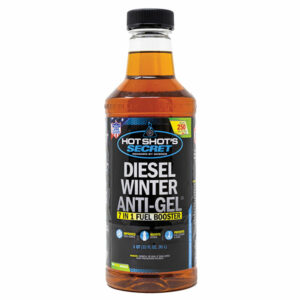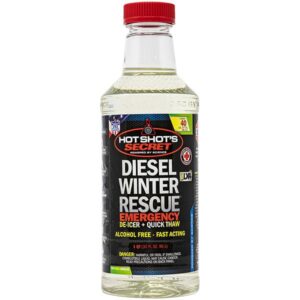
Diesel fuel may experience many significant challenges during the cold season. From freezing to gelling, various side effects may reduce engine performance and reliability while increasing wear.
In this article, we’ll cover practical methods, such as additives, to help you avert cold-weather diesel issues and ensure optimal efficiency.
Why Winter Treatment Is Important for Diesel Fuel
Treating diesel fuel in winter is critical to avoid the challenges that winter brings. The right fuel additive offers a variety of benefits.
Prevent Fuel Gelling and Water Contamination
Most kinds of diesel fuel contain paraffin wax. In temperatures below freezing, the wax crystallizes, compromising fuel efficiency and function. By using an anti-gelling additive, you can effectively modify paraffin wax to prevent gelling and consequences like clogged filters or fuel lines.
Some additives prevent water from building up in the fuel tank, which helps prevent freezing and stabilizes the fuel.
Ensure Consistent Operation and Avoid Repairs
By preventing problems like fuel gelling and freezing, the right winter fuel additive can help to ensure your vehicle starts more easily, while avoiding stalling and other similar issues. Eliminating secondary concerns like clogged lines and fuel filters reduces the risk of costly repairs.
Reduce Engine Strain and Improve Efficiency
Fuel gelling or thickening, and wax crystallization in cold weather can increase engine strain and reduce efficiency. By addressing these issues, you can improve fuel economy while reducing system wear, resulting in better overall performance throughout the winter.
A high-quality diesel fuel winter treatment can offer secondary advantages like:
- Boosting cetane
- Improving lubricity
- Cleaning components
Choosing the Right Winter Diesel Additive
Choosing the right additive to treat your diesel fuel in winter hinges on a few critical considerations, including:
- How cold does it get in your area?
- Are you looking for a targeted or multifaceted approach?
- Which kind of diesel are you using?
Whether you’re dealing with intense cold or just the occasional cold snap, there’s a product that will suit your needs. Let’s discuss some premium product examples and what to look for in a diesel fuel treatment for winter.
Everyday Protection: EDT+ Winter Defense
EDT+ Winter Defense is an excellent example of a multifunction additive that treats diesel fuel to avoid common challenges associated with winter. This 7-in-1 formula can help:
- Prevent paraffin wax precipitation.
- Increase cetane levels.
- Improve fuel economy.
- Add lubricity.
- Keeps injectors clean for efficient operation.
- Lower the cold filter plugging point (CFPP).
- Removes water with a demulsifier.
- Protect against rust and corrosion.
With all of these qualities, EDT+ Winter Defense prevents wax crystals from clogging fuel lines and filters while enhancing engine power.
Key Features to Look For
When you’re trying to pick the right additive for your vehicle, there are a few features that should be nonnegotiable, including:
- Low-temperature performance: When working with fuel additives, you want one that will offer consistent anti-gelling performance, even at low temperatures.
- Added lubricity protection: Generally, you want an additive that’s going to improve fuel lubricity to protect fuel pumps, injectors and other moving parts.
- Improved cetane content: To keep your engine running smoothly in cold temperatures, you need improved cetane content from your additives to encourage smooth starts.
- Moister control: You want to safely remove any water and moister from the fuel using a water demulsifier.
- Fuel stabilization ingredients: For optimal results, select an additive that stabilizes fuel by controlling asphaltenes to maintain long-term engine health.
How to Treat Diesel Fuel for Cold Weather: Practical Steps
Before the cold weather rolls in, some of the most sensible steps include:
- Using an additive before the temperatures drop too low.
- Adding to the fuel at fill-up, not allowing the fuel to get to cold and into the cloud point.
- Mixing fuel thoroughly to ensure additives are distributed evenly.
- Keeping fuel tanks full to reduce the potential for condensation.
It’s also worth performing all your routine preventive maintenance before winter to ensure your vehicle is prepared. That includes cleaning air and fuel filters, checking injectors for any buildup and performing oil changes, if necessary.
Simple Winter Preparation With Diesel Additives
Using a premium fuel additive can help keep diesel flowing through the cold months. Give your vehicle the gift of better performance and a protected engine with a trusted fuel additive.
Invest in EDT+ Winter Defense for daily winter treatment to defend against the most extreme conditions.



